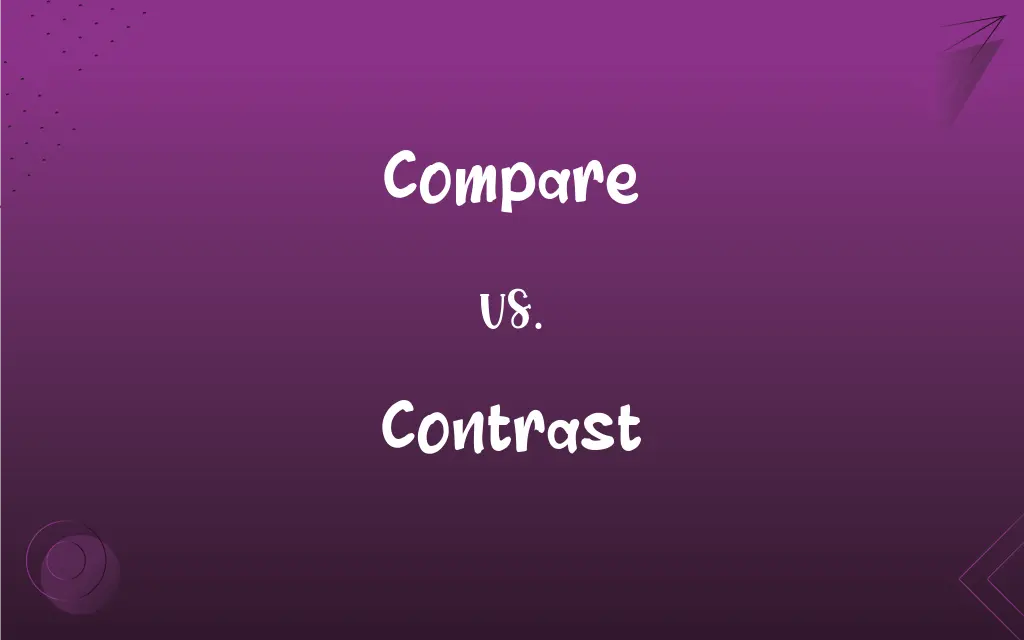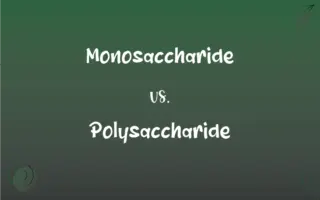Compare vs. Contrast: What's the Difference?
Edited by Janet White || By Harlon Moss || Updated on October 10, 2023
Compare: To examine similarities or differences between two or more items. Contrast: To specifically highlight differences between two or more items.

Key Differences
Compare and contrast share a role in evaluating two or more items alongside each other. The word compare implies an assessment where you look for both similarities and differences between the items under scrutiny. It can bring to light various aspects in which those items are alike or distinct, presenting a comprehensive perspective that often illuminates unique characteristics. For instance, one might compare apples and oranges, noting that both are fruits, but differ in flavor and texture.
Conversely, contrast is predominantly concerned with delineating differences. When you contrast items, you detail how they are dissimilar, often to underline a stark distinction or to emphasize diverse characteristics. Contrast, in its application, is generally utilized to underscore the disparity between two things, unlike compare, which encompasses a broader evaluation.
Interestingly, compare can be often seen in contexts where things bearing semblance are put together to enhance understanding of their respective features. Such examination might reveal not just how they diverge, but also how they relate, providing a multifaceted analysis that aids in a deeper understanding and potentially enabling more informed decisions or insights.
Contrast, with its focus squarely on divergence, brings forth the disparities without necessarily highlighting any common ground. It isolates the differing attributes, giving a clear-cut view of how two or more things do not align. This sharp focus can be pivotal in contexts where distinctions are crucial, and any similarities are considered redundant or irrelevant.
It's worthy to note that while compare and contrast are related concepts, their practical application can notably impact the perception, analysis, and resultant conclusions when evaluating items or ideas. Recognizing when to employ comparison and when to pinpoint contrast is pivotal in various disciplines, including writing, to convey precise, contextually apt insights.
ADVERTISEMENT
Comparison Chart
Meaning
Identify similarities and differences
Highlight primarily the differences
Usage
Employed for both alike and different
Used to underline stark differences
Connotation
Neutral or positive
Neutral or might imply divergence
Example Usage
Compare X and Y
Contrast X with Y
Synonyms
Equate, liken, analogize
Differentiate, distinguish, set against
ADVERTISEMENT
Compare and Contrast Definitions
Compare
To inspect in respect of similarities and differences.
Compare the two novels for their themes and character development.
Contrast
To exhibit unlikeness on comparison with something else.
The twins contrast sharply in their academic interests.
Compare
To form the comparative and superlative forms of an adjective or adverb.
In grammar, we often compare adjectives by using er and est.
Contrast
A device in art to highlight opposing elements (e.g., colors, shapes).
The artist utilized contrast to enhance the visual appeal of the painting.
Compare
To be of equal or similar quality or value.
The two options did not compare in terms of overall value.
Contrast
To set in opposition to bring out differences.
The author will contrast the protagonists’ ideologies in the next chapter.
Compare
To draw similarities between things for metaphorical expression.
The poet would compare her love to a red, red rose.
Contrast
The state of being strikingly different from something else.
The contrast between the two buildings’ architecture is noticeable.
Compare
To consider or describe as similar or analogous.
The teacher asked to compare the weather patterns of two different cities.
Contrast
To arrange or juxtapose items to show disparity.
The museum will contrast artifacts from different eras in the new exhibit.
Contrast
To set in opposition in order to show or emphasize differences
An essay that contrasts city and country life.
Contrasted this computer with inferior models.
FAQs
How is contrast different from compare?
Contrast specifically focuses on highlighting and explaining the differences between two items, while compare considers both similarities and differences.
Can I use compare and contrast interchangeably?
No, because "compare" often examines both similarities and differences, while "contrast" exclusively looks at differences.
Can compare and contrast be used together in analysis?
Yes, often analyses ask for both comparison (looking at similarities) and contrast (looking at differences) to give a comprehensive view.
When writing, how do I structure a compare and contrast essay?
Typically, a compare and contrast essay will introduce the items to be compared/contrasted, present points of comparison/contrast one by one, and conclude with a summary and analysis of the findings.
What does it mean to compare two things?
To compare means to evaluate two or more items to identify their similarities and differences.
Can 'compare' suggest similarity only?
It might, depending on context, but technically 'compare' involves considering both similarities and differences.
What’s a synonym for 'compare'?
Synonyms might include 'liken,' 'relate,' or 'analogize.'
Can I say "compare to" or "compare with"?
Both can be correct but are used differently. "Compare to" is often used to assert similarity, while "compare with" might be used to highlight differences.
How can I use 'compare' in a sentence?
"Can you compare the benefits of these two insurance policies?"
Can 'contrast' imply opposition?
Yes, when items are contrasted, their differences might be highlighted to emphasize opposing characteristics.
Is there a specific format for compare and contrast writing?
While there is flexibility, a common format involves an introduction, a body where each point of comparison/contrast is discussed, and a conclusion summarizing the findings.
Does contrasting involve evaluating the quality of items?
Not necessarily. Contrasting focuses on pointing out differences, not determining which item is superior.
Can contrasting be done with more than two items?
Yes, you can contrast multiple items, though it may become complex.
What is comparative form in grammar?
Comparative form involves modifying adjectives or adverbs to denote degrees of difference among items (e.g., smaller, faster).
What is the purpose of contrast in art?
In art, contrast is used to create visual interest and direct the viewer's attention by placing opposing elements, like colors or shapes, next to each other.
Are compare and contrast only used objectively?
Mostly, but they can also be used subjectively depending on the context and what is being compared or contrasted.
Is contrast always related to visual aspects?
No, contrast can pertain to any discernable difference, not just visual ones.
How do I choose points of comparison or contrast?
Select points that are relevant and offer clear, insightful distinctions or parallels between the items.
Why is it useful to compare and contrast in academic writing?
It helps to develop critical thinking, enhance analytical skills, and present a balanced, informed argument.
In what contexts are compare and contrast typically used?
They’re widely used in various fields such as writing, science, and business, to evaluate, analyze, and elucidate the characteristics of items or concepts.
About Author
Written by
Harlon MossHarlon is a seasoned quality moderator and accomplished content writer for Difference Wiki. An alumnus of the prestigious University of California, he earned his degree in Computer Science. Leveraging his academic background, Harlon brings a meticulous and informed perspective to his work, ensuring content accuracy and excellence.
Edited by
Janet WhiteJanet White has been an esteemed writer and blogger for Difference Wiki. Holding a Master's degree in Science and Medical Journalism from the prestigious Boston University, she has consistently demonstrated her expertise and passion for her field. When she's not immersed in her work, Janet relishes her time exercising, delving into a good book, and cherishing moments with friends and family.































































